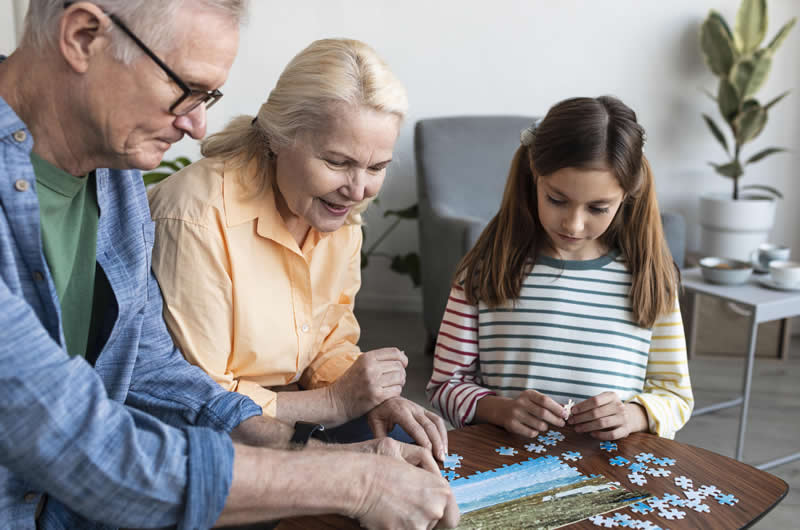Puzzling it out – brain boosting fun for older adults
A good puzzle is more than just a way to pass the time – it’s a workout for the brain, a source of satisfaction, and often an opportunity to connect socially with others. Whether it’s solving a crossword, cracking today’s Wordle, or finding that one elusive jigsaw piece, puzzles offer plenty of benefits for older adults – and they’re fun too!
Why puzzles are good for you
As we get older, staying mentally sharp becomes more important than ever. Puzzles stimulate the brain, improve memory, boost problem-solving skills, and help maintain focus and concentration. Best of all, they’re enjoyable – which makes them a powerful, low-cost tool for healthy ageing.
Solving puzzles can also help reduce stress and anxiety. They create a calm, focused state of mind, similar to meditation. And completing a puzzle – especially a tough one – brings a sense of accomplishment that lifts the mood.
Some studies even suggest that regular puzzle play may delay the onset of dementia symptoms by keeping the mind active and engaged.

Our elders share their favourites
An informal poll among elders living at various Tafta residences revealed that the favourite brainteaser is none other than the perennial crossword puzzle. Experienced crossword fundis enjoy cryptic crosswords, that require not only general knowledge but the ability to solve anagrams and riddles within the clues.
Many elders grew up enjoying crosswords in the daily press. Nowadays, there are a number of online options including BestCrosswords.com which publishes 15 grids daily – enough for even the most demanding puzzlers. There are also a number of free crossword apps to download and solve on your phone. Try Redstone Games and Easybrain available from Google Play and the App Store.
Board and card games
Games like Scrabble, Monopoly and Solitaire are firm favourites with our elders. While Solitaire has a lot to do with the luck of the cards, it still challenges sequencing and planning skills. Free apps are available to download Solitaire onto your phone – allowing you to play anywhere, anytime.
If you prefer the social element, nothing beats an old-fashioned Monopoly board where up to 8 players can join in, encouraging friendly competition and connection. Scrabble accommodates 2-4 players. There are online versions of Scrabble available that allow you to pit your wits against friends and family overseas … or even complete strangers. Like crosswords, Scrabble helps improve vocabulary and keeps your brain agile.
Card games like Bridge require mental acuity by challenging players to anticipate moves and work as a team. Along with the simpler game of Rummy, there’s a social aspect to these games that enhances emotional well-being and provides seniors with a regular social outlet.

Wordle
Another word game, Wordle has taken the world by storm – and it’s perfect for seniors! Simple to play and satisfying to solve, this five-letter word guessing game encourages strategic thinking, spelling, and language processing. It’s played online at https://www.nytimes.com/games/wordle/
Unfortunately, there’s only one puzzle per day. But it’s fun to work it into your daily routine, track your stats and compete with friends to see who can guess ‘today’s’ word in the fewest moves.
Jigsaw puzzles
From scenic landscapes to nostalgic images, jigsaw puzzles are a wonderful way to relax. They also support spatial awareness, hand-eye coordination, and visual memory. Working on a jigsaw together with a friend or grandchild is both fun and rewarding.

Trivia Games
Proud of your general knowledge? Seniors often have the edge when it comes to trivia games like 30 Seconds, especially against younger family members who just haven’t had the time and experience to amass vast stores of knowledge.
To balance the scales, try Beat the Parents – a trivia game with a twist that’s perfect for inter-generational bonding. It’s kids versus parents (or grandparents). And, because children and adults live in different worlds, each generation gets their own set of questions. Do you know what your children or grandchildren know? You might be surprised!
Sudoku
Another favourite for those who love logic is Sudoku. With a few clues to start you off, you need to fill in the grid so that each column, row, and large square contains every number from 1 to 9. Although it’s a number puzzle, there is no maths involved … unless you opt for Killer Suduko.
With this variation, certain squares within the grid are grouped together and must add up to the number printed above the group. All the other rules are the same. Knowing that each block, row and column must contain every number from 1-9 gives you a head start, in that these numbers add up to 45. This allows the mathematician in you to solve the puzzle!
Games on your phone
Games like Tetris and Candy Crush (available via your phone’s App Store) require good hand/eye co-ordination and quick reactions. But beware, these and other similar games are incredibly addictive. You may find yourself trying just one more game … and then just one more … to try to improve your score.
Make puzzle time a daily habit
Just 15–30 minutes of puzzle play a day can bring noticeable benefits – and it’s something you can look forward to! Whether you start the morning with a Wordle, end the day with a jigsaw session, or work your way through a Sudoku puzzle book over tea, your brain will thank you.
Puzzles may seem like simple fun – but beneath the surface, they’re helping older adults maintain mental sharpness, emotional well-being, and even social connection.
So next time you pick up a pencil or start fitting puzzle pieces together, remember – you’re not just passing time. You’re giving your brain a gift.






 Sisonke – ‘we are together’
Sisonke – ‘we are together’ From Durban Social Worker to Global Champion for Older Persons
From Durban Social Worker to Global Champion for Older Persons Christmas joy – good food and good company, thanks to you!
Christmas joy – good food and good company, thanks to you! Robin Hood Foundation spreads love across Tafta Homes
Robin Hood Foundation spreads love across Tafta Homes 12 Days of Giving – spread joy to older people this Christmas
12 Days of Giving – spread joy to older people this Christmas Tafta resident pens powerful tribute to heritage and hope in new book
Tafta resident pens powerful tribute to heritage and hope in new book Introducing TEAL – our upgraded national Elder Abuse Helpline
Introducing TEAL – our upgraded national Elder Abuse Helpline Beat the year-end blues – 6 tips for staying positive during ‘silly season’
Beat the year-end blues – 6 tips for staying positive during ‘silly season’ Wisdom on ageing – the most exquisite chapter
Wisdom on ageing – the most exquisite chapter Thriving through 2025 – a toast to life
Thriving through 2025 – a toast to life